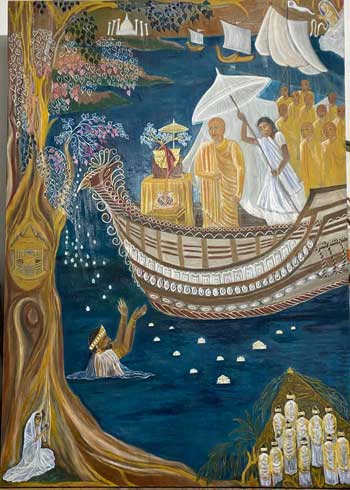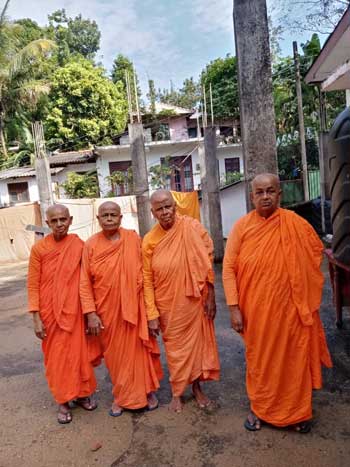The struggle for the Bhikkhuni Sasana to be revived in Sri Lanka

Theri Sangamitta's arrival: A painting by Avanti Sri Nissanka Karunaratne
Unduvap Full Moon Poya falls on December 14 this year and the Sri Pada season will begin on this day.
Importantly, Unduvap Poya marks the arrival of Sanghamitta Theri in Sri Lanka in the 3rd century B.C., bringing with her a sapling of the Sri Maha Bodhi from Buddha Gaya as a gift from Emperor Ashoka of India, to King Devanampiyatissa.
The arrival of Arahant Theri Sanghamitta opened the doors for women to join the Bhikkhuni Sangha. Yet today, centuries later the ordination of bhikkhunis is not formally accepted in Sri Lanka, despite many women seeking to join the order.
Many bhikkhunis are playing an important role in society, especially as kalyana mitra (true friends) for women and children in need. When the Sunday Times visited the Gunatillake Aramaya in Pamunuwa, Handessa, close to Pilimatalawa, it could be seen how the bhikkhunis there help the villagers in and around the aramaya who have been badly affected by the COVID pandemic and the recent economic crisis.
The Chief Bhikkhuni Ven. Malmaduwé Shantha Dharini and the other bhikkhunis have started growing vegetables and fruit for their own use and to distribute among the villagers who live in very difficult circumstances, many being unemployed. Two pre-school teachers conduct classes in the Aramaya premises.
The villagers come to observe sil on Poya days and the bhikkhunis help them in whatever way possible and practise metta and karuna the true teachings of the Buddha Dhamma. Ven. Bhikkhuni Suvimalee said that they cannot even offer dana(alms) regularly.
In the Buddha’s time, though prevailing societal norms confined women to their homes and they were considered as not equal to men, the Buddha was able to change this attitude and many women who learned the Dhamma developed confidence and gained self-respect. Thus Buddha liberated women saying “women are equal to men in achieving spiritual enlightenment and their prañña (wisdom) is not a thing to be doubted” and thousands of women entered the bhikkhuni sasana (order).
The first to be ordained a bhikkhuni was Queen Prajapati Gothami, aunt of Siddhartha Gauthama Buddha. In Sri Lanka, the first bhikkhuni was Anula Devi, wife of a Yuva Raja(sub-king). It is significant that the first women to be ordained as bhikkhunis in India and Sri Lanka were both of royal descent.
In Sri Lanka the Bhikkhuni Sangha flourished during the Anuradhapura period but after about 1000 years it went into decline due to dissension between the two monasteries Abhayagiri and Jetavana. The South Indian Chola invasion also affected the Bhikkuni Sangha; families of the bhikkhunis disrobed them and took them home for safety. A prolonged drought and famine saw many bhikkhunis die of starvation. Even the bhikkhus (monks) left the monasteries.

The Bhikkhunis at the Aramaya in Pamunuwa
Due to the lack of bhikkhus, a group named ganinnanses appeared. But they were not pious as the bhikkhus. However, over the centuries there was a great effort to revive the Bhikkhu Sasana and in 1753, King Kirti Sri Rajasinha of Kandy invited Maha Thera Upali from Thailand to visit the country and revive upasampada (higher ordination) for monks.
But there was no interest in reviving the Bhikkhuni Sasana.
It was only Anagarika Dharmapala, Dr. Gunapala Malalasekera and a few other laymen who supported the revival of the Bhikkhuni Sasana.
It was in 1993 that Kusuma Devendra, Ranjani de Silva and Prof. Hema Goonetilleke approached Ven. Dr. Mapalagama Vipulasara Thera after the Sakyadhita International Buddhist Conference at the BMICH, where the main topic was resurrecting the Bhikkhuni Order in Sri Lanka. As Prof. Goonetilleke records, “(they) implored the Ven. Thera to help them resurrect the bhikkhuni order in Sri Lanka. The Ven. Thera readily agreed.”
Prof. Goonetilleke’s research studies mention Bhikkhuni Devasara and other bhikkhunis from Sri Lanka who had travelled under hazardous conditions along the Silk Route to reach China to establish the Bhikkhuni Order there. Prof. Goonetilleke further says, “This incident is recorded in golden letters in China, but not well recorded in Sri Lanka.” From China, this order had spread to Korea, Taiwan, Vietnam and Japan to continue the Theravada bhikkhuni Order.
With the help of Ven. Dr. Vipulasara Thera, Kusuma Devendra who was well versed in the Bhikkhuni Vinaya and nine other sil mathas from Sri Lanka were ordained at the sima in Isipatanaramaya in Benares, India on December 8, 1996 by ten Korean bhikkhus and ten Korean bhikkunis. Ven. Walpola Piyananda Maha Thera had been present at the ordination ceremony. The first Sri Lankan bhikkhuni to be ordained in recent times is Bhikkhuni Kusuma.
Ven. Bhikkhuni Kusuma M.A., Ph.D. in her book Revival of the Bhikkhuni Ordination in Sri Lanka explains the research she did in South Korea in her desire to revive the bhikkhuni sasana. She read the Korean Dharmaguptaka Vinaya in translation and found it to be similar to the Theravada Vinaya.
Dr. Senerath Wijesundera in his writings has proposed ways in which the Bhikkhuni Order could be re-established.
1) The possibility of getting ordination from China, Taiwan and Korea where the Sri Lankan bhikkhuni ordination exists up to today. (In the sixth century A.D. Sri Lankan bhikkhuni ordination reached China and subsequently other countries).
2) Women in Sri Lanka being given the right to get ordination from whatever country they wish, and practise here in Sri Lanka.
3) Sri Lankan bhikkhus who have good ties with monks of other countries, could discuss the possibility of an agreement on a suitable procedure to grant ordination to women in Sri Lanka.
The first bhikkhunis who were ordained had royal patronage in this country and for a thousand years they were recognized as bhikkhunis. But at present, they are still known as Sil-mathas and are not even issued with identity cards for bhikkhunis.
Searching for an ideal partner? Find your soul mate on Hitad.lk, Sri Lanka's favourite marriage proposals page. With Hitad.lk matrimonial advertisements you have access to thousands of ads from potential suitors who are looking for someone just like you.


